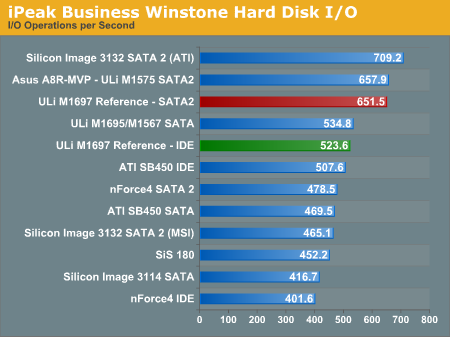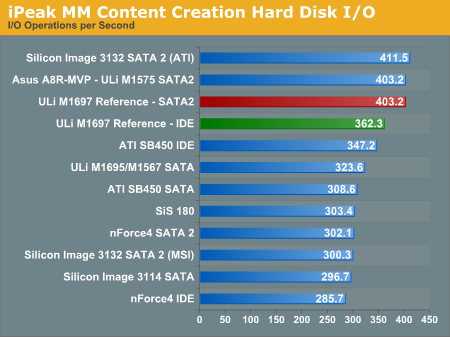FIRST LOOK: ULi M1697 for Athlon 64/x2
by Wesley Fink on December 13, 2005 12:05 AM EST- Posted in
- CPUs
USB Performance
USB 2.0 performance has been a problem area for some chipsets, so benchmarks were run to test USB performance of the new ULi M1697. We ran our standard USB throughput test on the ULi M1697 using an external USB hard drive.
Our test method uses a RAM disk as our “server”, since memory removes almost all overhead from the serving end. We also turn off disk caching on the USB and Firewire side by setting up the drives for “quick disconnect”. Our results are then consistent over many test runs.
We use just 1GB of fast 2-2-2 system memory, set up as a 450MB RAM disk and 550MB of system memory. Our stock file is the SPECviewPerf 8.01 install file, which is 432,533,504 bytes (412.4961MB). After copying this file to our RAM disk, we measure the time for writing from the RAM disk to our external USB 2.0 or Firewire 400 or Firewire 800 drive using a Windows timing program written for AnandTech by our own Jason Clark. The copy times in seconds are then converted into Megabits per second (Mb) to provide a convenient means of comparing throughput. Higher Rates, therefore, mean better performance.
Disk Controller Performance
With the variety of disk drive benchmarks available, we needed a means of comparing the true performance of the wide selection of controllers. The logical choice was Anand's storage benchmark first described in Q2 2004 Desktop Hard Drive Comparison: WD Raptor vs the World . To refresh your memory, the iPeak test was designed to measure "pure" hard disk performance. The hard drive was kept as consistent as possible while varying the hard drive controller. The idea is to measure the performance of a hard drive controller with a consistent hard drive.
We played back raw files that recorded I/O operations when running a real world benchmark - the entire Winstone 2004 suite. Intel's iPEAK utility was then used to play back the trace file of all IO operations that took place during a single run of Business Winstone 2004 and MCC Winstone 2004. The drive was formatted before each test run and a composite average of 5 tests on each controller interface was tabulated in order to ensure consistency in the benchmark.
iPeak gives a mean service time in milliseconds; in other words, the average time that each drive took to fulfill each IO operation. In order to make the data more understandable, we report the scores as an average number of IO operations per second so that higher scores translate into better performance. This number is meaningless as far as hard disk performance is concerned, since it is just the number of IO operations completed in a second. However, the scores are useful for comparing "pure" performance of the storage controllers in this case.
USB 2.0 performance has been a problem area for some chipsets, so benchmarks were run to test USB performance of the new ULi M1697. We ran our standard USB throughput test on the ULi M1697 using an external USB hard drive.
Our test method uses a RAM disk as our “server”, since memory removes almost all overhead from the serving end. We also turn off disk caching on the USB and Firewire side by setting up the drives for “quick disconnect”. Our results are then consistent over many test runs.
We use just 1GB of fast 2-2-2 system memory, set up as a 450MB RAM disk and 550MB of system memory. Our stock file is the SPECviewPerf 8.01 install file, which is 432,533,504 bytes (412.4961MB). After copying this file to our RAM disk, we measure the time for writing from the RAM disk to our external USB 2.0 or Firewire 400 or Firewire 800 drive using a Windows timing program written for AnandTech by our own Jason Clark. The copy times in seconds are then converted into Megabits per second (Mb) to provide a convenient means of comparing throughput. Higher Rates, therefore, mean better performance.

Disk Controller Performance
With the variety of disk drive benchmarks available, we needed a means of comparing the true performance of the wide selection of controllers. The logical choice was Anand's storage benchmark first described in Q2 2004 Desktop Hard Drive Comparison: WD Raptor vs the World . To refresh your memory, the iPeak test was designed to measure "pure" hard disk performance. The hard drive was kept as consistent as possible while varying the hard drive controller. The idea is to measure the performance of a hard drive controller with a consistent hard drive.
We played back raw files that recorded I/O operations when running a real world benchmark - the entire Winstone 2004 suite. Intel's iPEAK utility was then used to play back the trace file of all IO operations that took place during a single run of Business Winstone 2004 and MCC Winstone 2004. The drive was formatted before each test run and a composite average of 5 tests on each controller interface was tabulated in order to ensure consistency in the benchmark.
iPeak gives a mean service time in milliseconds; in other words, the average time that each drive took to fulfill each IO operation. In order to make the data more understandable, we report the scores as an average number of IO operations per second so that higher scores translate into better performance. This number is meaningless as far as hard disk performance is concerned, since it is just the number of IO operations completed in a second. However, the scores are useful for comparing "pure" performance of the storage controllers in this case.












51 Comments
View All Comments
semiconductorslave - Wednesday, December 14, 2005 - link
I was replying to the first comment on the post, "Why do all the new motherboards have all these PCIe slots when there is nothing available to stick in them."I made the assumption that since this person said there was nothing availible, that he or she did not make any effort to search. My example of Newegg and Google was narrow on purpose, showing how easy it is to find out what is availible when one starts looking. I was only trying to make a point that people instead of asking right away, could spend a little effort and maybe say something like, "I found these cards, are there any more?"
But saying, "YOU don't have the ability to see how the information's presentation is relevant." is quite an assumption on your part about my abilities.
mindless1 - Thursday, December 15, 2005 - link
Not an assumption at all, it comes straight from what you wrote, and yes it was in the context of what you'd replied to.semiconductorslave - Thursday, December 15, 2005 - link
You say, "you need to learn to think for someone other than yourself" but I didn't see you list any cards, where I at least did search and made a comment about how one should at least attempt to look for themselves before making comments like there aren't any PCI ex cards. Are you daft? You must just be trying to get my goat. I was trying to make a point but if you want to go on the attack, that isn't a productive debate anymore. I would suggest you don't take your own advice and try to think for anyone else since I don't think you can spare the mental energy.You can now have the final word as this is going nowhere.
Ozz1113 - Tuesday, December 13, 2005 - link
SCSI, raid drive controllers...Wesley Fink - Tuesday, December 13, 2005 - link
Gigabit Ethernet PCIe x1 controllers.Missing Ghost - Tuesday, December 13, 2005 - link
tv tunersceefka - Tuesday, December 13, 2005 - link
PCI-e Firewire 400 and 800 cards by SIIG and BelkinCalin - Tuesday, December 13, 2005 - link
The new Creative xFi cards are PCIe 1xLoneWolf15 - Tuesday, December 13, 2005 - link
Sad to say, they are not, they're plain-jane PCI. People had hoped they would be, but Creative is unlikely to do PCIe until its next-gen card after the X-Fi. Even with the X-Fi and todays most advanced games that can use its features, there isn't enough data being transferred to saturate the PCI bus.
mindless1 - Tuesday, December 13, 2005 - link
... isn't enough data to saturate from this one lone card, but seldom does a board only have one PCI slot. It's not the audio card that's the issue, it's when the audio card interferes with OTHER cards.